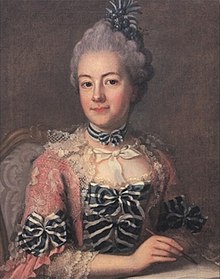Hedvig Charlotta Nordenflycht
Hedvig Charlotta Nordenflycht (born November 28, 1718 in Stockholm ; † June 29, 1763 in Lugnet near Skokloster Castle ) is one of the most important Swedish writers of the Enlightenment .
Life
Hedvig Charlotta Nordenflycht was born as the daughter of the civil servant Anders Andersson Nordbohm (1675–1734) and Christina Rosin. 1727 her father was ennobled under the name Nordenflycht. Although the upbringing of girls was limited to housework at that time, she attended home schooling from her older brother. Johan Tidemann introduced them to Enlightenment theology and philosophy . She wrote her first poems at the age of 13. When she was 16, her father was engaged to Johan Tideman on the death bed. The marriage did not materialize because Tidemann died three years later.
In 1741 she married the poetically gifted Jacob Fabricius (1704–1741), who had taught her in French. Her husband took up his first pastorate in Karlskrona . The marriage ended eight months later with Fabricius' death. The young widow's grief found its expression in the poetry collection Den sörgande Turtur-Dufwan (The mourning turtle dove) in 1743, with which she had her first great success. Hedvig Charlotta Nordenflycht subsequently devoted himself mainly to literature, which became the basis of her livelihood for her, since neither her father nor her husband had inherited an inheritance. Poems for Queen Ulrika Eleonora and other members of the royal family, as well as commissioned poetry , helped her to earn a small income from 1742 onwards. Between 1744 and 1750 a number of occasional poems, didactic poems, political poems and historical epics were written , which are summarized in the Qwinligit tankespel collection (female thought game). In 1752 the Reichstag issued her a generous annuity , which secured her further literary work, and she became Olof von Dalin's greatest competitor , whose position as the leading poet of the time she gradually took over.
Hedvig Charlotta Nordenflycht liked to express herself on political and philosophical questions. Last but not least, this also applied to the position of women. In several works, v. a. Fruentimbers Plikt att upöfwa deras Wett (the duty of women to use the mind) 1744 and Fruentimrets försvar (defense of women) 1761, she attacked the oppression of women by the patriarchal society. That the woman is inferior to the man, that she belongs to the "weaker sex", is only the discharge of a "weak, male brain". Men treated women as either goddesses or worms, but whichever way they treated them, they would see that women were excluded from education and skilled work. Nordenflycht said that it is a right and a duty for women to read and to educate themselves in order to achieve independence.
At the height of her career, she met a much younger man, Johan Fischerström, with whom she fell in love. The love story ended unhappily and in her poem Över en hyacint (About a hyacinth) in 1762 she resignedly described impossible love. She died a year later.
Works
- 1743 the sörgande Turtur-Dufwan
- 1744 Fruentimbers Plikt att upöfwa deras Wett
- 1750 Qwinligit fuel tank
- 1761 Fruentimrets försvar
- 1762 Över en hyacint
Web links
- Short biography in the Meyers Lexicon
- Selected poems in German translation, with a biographical summary, 1859
| personal data | |
|---|---|
| SURNAME | Nordenflycht, Hedvig Charlotta |
| BRIEF DESCRIPTION | Swedish writers |
| DATE OF BIRTH | November 28, 1718 |
| PLACE OF BIRTH | Stockholm |
| DATE OF DEATH | June 29, 1763 |
| Place of death | Lugnet (Håbo) |
